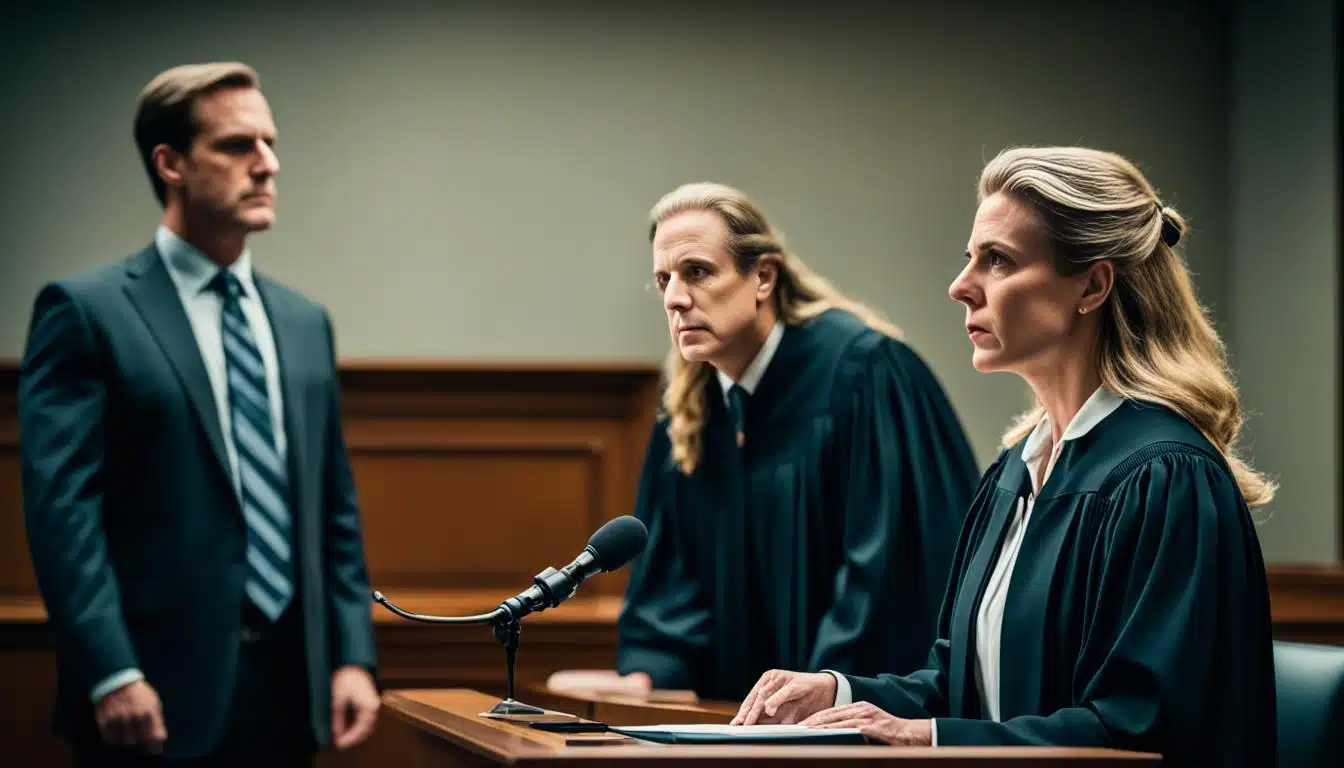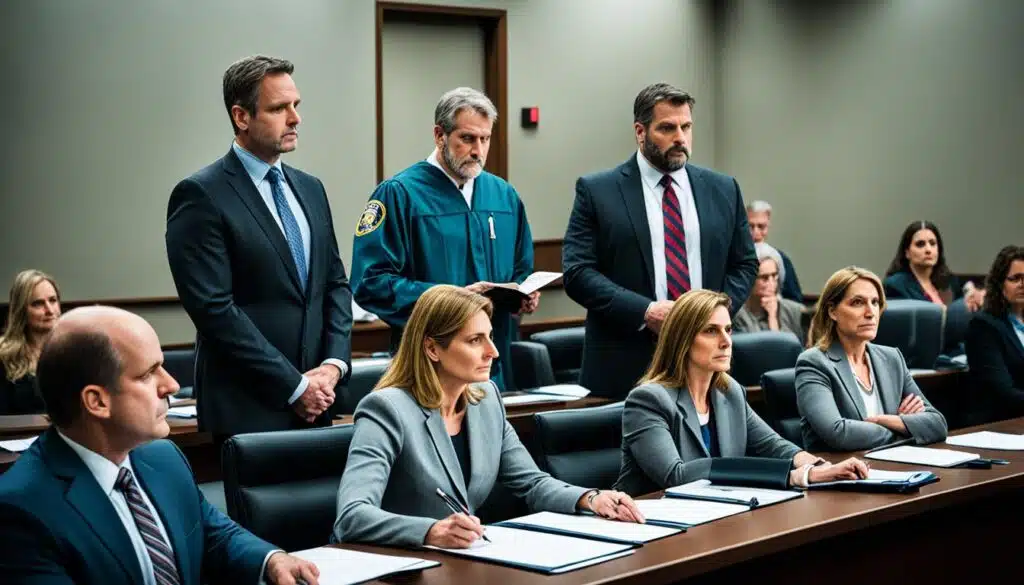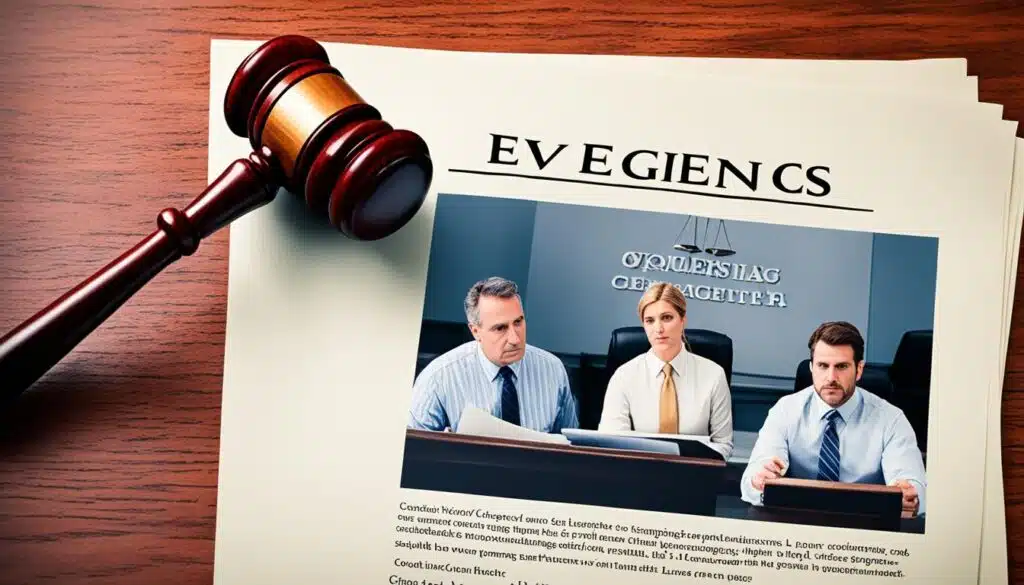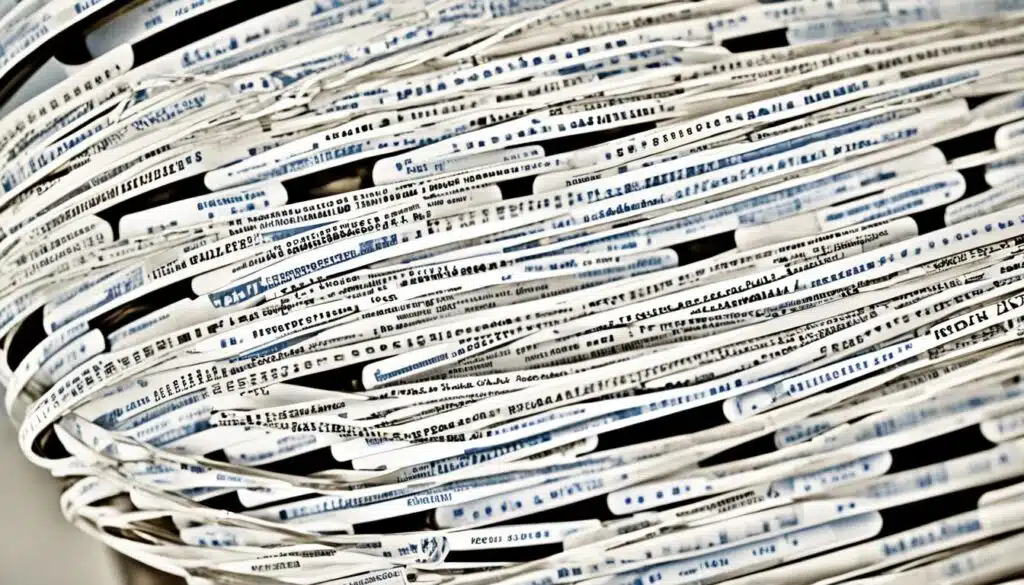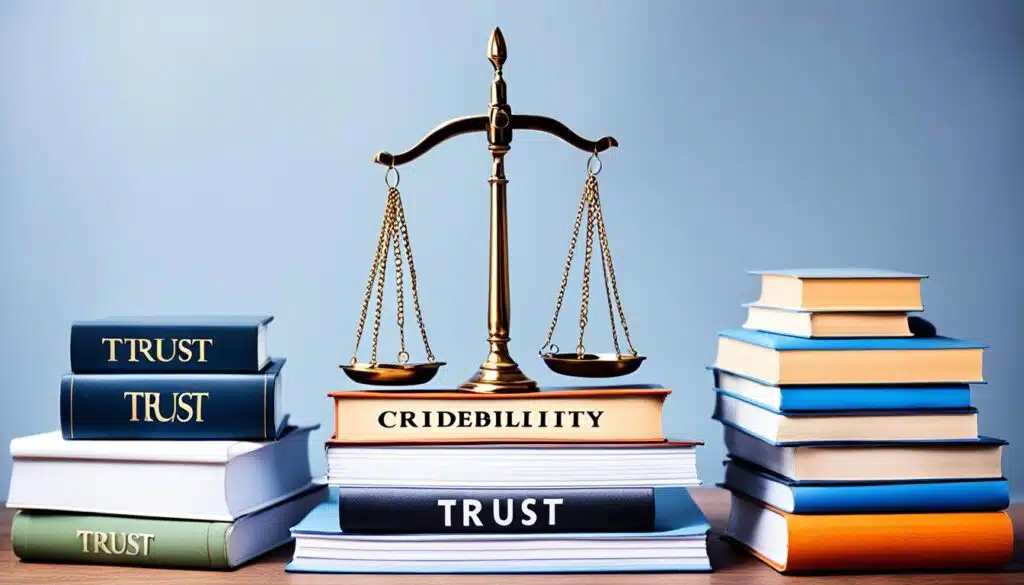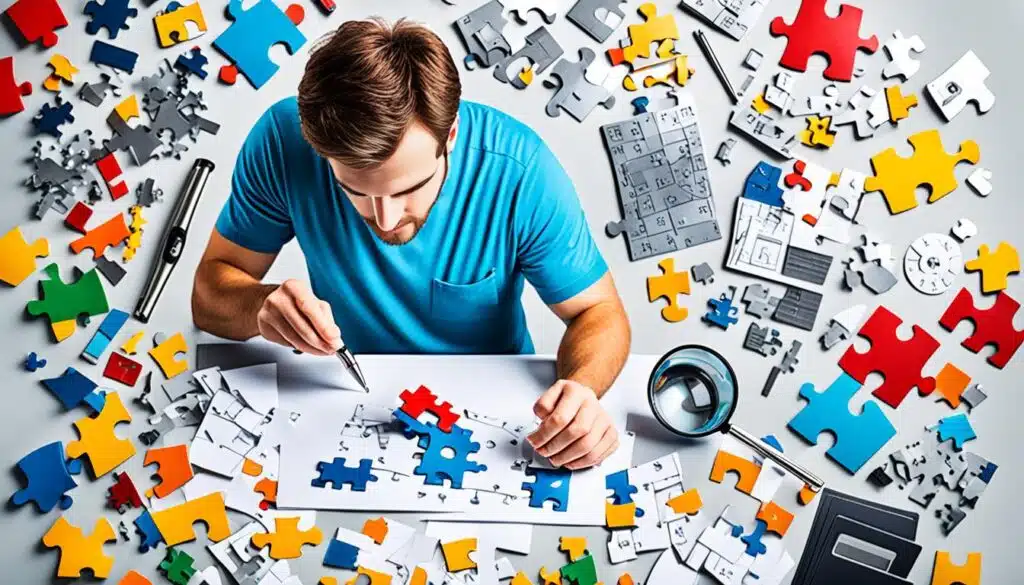When it comes to litigation, expert witnesses bring specialized knowledge and expertise that can significantly strengthen a case. Their invaluable contributions can help educate the court and jury, challenge or reinforce evidence, establish causation, build trust and credibility, and even facilitate settlements. Let’s explore the key role expert witnesses play in litigation cases and how they can enhance the strength of your case.
Key Takeaways:
- Expert witnesses provide specialized knowledge and expertise in a litigation case.
- They educate the court and jury on technical or scientific matters relevant to the case.
- Expert witnesses can strengthen or challenge the evidence presented.
- They play a crucial role in establishing causation in cases involving personal injury, medical malpractice, or product liability.
- Expert witnesses bring trust and credibility to the courtroom and can help facilitate settlements.
Expert Witnesses Defined
Expert witnesses are individuals with specialized knowledge, training, or experience in a particular field relevant to the case. They provide unbiased and objective opinions based on their expertise, which assists the court in understanding complex issues beyond the knowledge of the average person. Their role is to educate the court and jury on technical or scientific matters that may be pivotal to the case.
Expert witnesses bring expertise and credibility to the litigation process. They possess specialized knowledge acquired through years of training and experience in their respective fields. Their diverse backgrounds enable them to provide valuable insights and interpretations that help the court and jury make informed decisions.
“Expert witnesses play a crucial role in our legal system by offering their specialized knowledge, training, and experience to assist the court and jury in understanding complex issues. Their unbiased opinions and expertise provide valuable insights, helping to uncover the truth and ensure justice is served.”
Expert witnesses are not mere advocates for one side of the case; they are meant to provide unbiased opinions based on their expertise. They present evidence and analysis in a clear and informative manner, allowing the court and jury to objectively evaluate the facts presented. Their commitment to impartiality ensures fairness and transparency in the legal process.
| Benefits of Expert Witnesses |
|---|
| Specialized knowledge in a specific field |
| Unbiased and objective opinions |
| Educating the court and jury on technical matters |
| Enhancing credibility and trust in the courtroom |
| Facilitating settlement negotiations |
Expert witnesses offer valuable insight and expertise that helps to bridge the gap between technical and legal aspects of a case. Their ability to communicate complex ideas in a clear and concise manner makes them indispensable in litigation. By providing unbiased opinions based on specialized knowledge, expert witnesses contribute to the pursuit of justice.
Educating the Court and Jury
One of the primary functions of an expert witness is to educate the court and jury on technical or scientific matters that may be pivotal to the case. Expert witnesses have the unique ability to break down complex concepts into understandable terms, ensuring that judges and jurors can make informed decisions based on a comprehensive understanding of the evidence presented.
Expert witnesses play a crucial role in bridging the knowledge gap between the courtroom and specialized fields. They possess the expertise to explain intricate technical matters and present complex ideas in a clear and accessible manner. By doing so, they help the court and jury grasp the significance and implications of the evidence at hand.
Through expert testimony, the court and jury can gain a deeper understanding of the scientific principles, industry standards, or specialized processes relevant to the case. This knowledge empowers judges and jurors to make well-informed decisions and ensures that the verdict is based on a thorough comprehension of the legal and technical aspects of the dispute.
Expert witnesses provide valuable context and context is key in helping the court and jury evaluate the evidence presented. They enable decision-makers to assess the credibility of the evidence and draw connections between complex theories and practical applications.
Moreover, expert witnesses not only present the facts but also offer insightful interpretations of the evidence presented. They can highlight crucial details that might have otherwise gone unnoticed, shedding light on connections, patterns, or discrepancies that impact the case. By providing the court and jury with varying perspectives and alternative explanations, expert witnesses encourage a comprehensive and nuanced analysis of the evidence.
Expert witnesses are skilled communicators who can adapt their communication style to suit the needs of the court and jury. Whether it’s testifying under direct examination, cross-examination, or explaining technical terms during the trial, they ensure that essential information is effectively transmitted and understood by all parties involved.
Benefits of expert witness education:
- Enhances the comprehension of technical matters and complex concepts
- Enables judges and juries to make well-informed decisions
- Provides context and clarity regarding the evidence
- Highlights critical details and alternative perspectives
- Facilitates effective communication in the courtroom
The importance of expert witness testimony in educating the court and jury cannot be overstated. Their ability to simplify complex ideas and provide insight into technical matters contributes to a fair and accurate evaluation of the evidence. Through their expertise, expert witnesses ensure that justice is served by promoting an informed and just resolution to the case.
| Role of Expert Witnesses in Educating the Court and Jury | Benefits |
|---|---|
| Explaining technical or scientific matters | Enhanced comprehension of complex concepts |
| Presenting industry standards and specialized knowledge | Enabling informed decision-making |
| Providing insightful interpretations of evidence | Contextualizing the evidence presented |
| Highlighting connections and patterns | Identification of critical details |
| Adapting communication to suit the courtroom | Effective transmission of information |
Strengthening or Challenging Evidence
Expert witnesses play a critical role in litigation cases by strengthening or challenging the evidence presented by both parties. Their involvement is instrumental in determining the credibility of the claims made by plaintiffs and the liability of the defendant.
When representing plaintiffs, expert witnesses provide credibility to the damages sought by substantiating the evidence presented. Their specialized knowledge and expertise validate the extent of the damages, making it harder for the defendant to dispute the claims. By presenting objective and scientifically grounded arguments, expert witnesses reinforce the case’s validity and enhance its chances of success.
“Expert witnesses not only bring credibility to the damages sought by plaintiffs but also help substantiate liability in litigation cases.”
Conversely, when representing defendants, expert witnesses play a crucial role in challenging the evidence presented by the plaintiff. They bring alternative explanations or arguments that cast doubt on the plaintiff’s case, weakening its strength and reducing its credibility in the eyes of the court and jury. By challenging the evidence, expert witnesses create reasonable doubt and open the door for a successful defense strategy.
In a medical malpractice case, for example, the defendant’s expert witness may present an alternative theory explaining the patient’s injuries, laying the foundation for a credible defense. By challenging the plaintiff’s evidence, the expert witness raises questions about causation and liability, making it more challenging for the plaintiff to prove their case.
Expert witnesses are key players in the litigation process, providing crucial support by strengthening or challenging the evidence presented. Their involvement significantly impacts the overall credibility and persuasive power of the case, potentially determining its outcome in court.
Establishing Causation
In litigation cases involving personal injury, medical malpractice, or product liability, proving causation is often a central issue. This requires demonstrating a direct link between the defendant’s actions and the plaintiff’s injuries or losses. Expert witnesses play a crucial role in establishing or disproving causation by analyzing the facts and data relevant to the alleged harm based on their expertise.
Expert witnesses bring their specialized knowledge and understanding of the specific field in question. They meticulously examine the evidence, consider the circumstances, and apply their expertise to determine whether the defendant’s actions directly caused the harm experienced by the plaintiff.
“By analyzing the data and applying their expertise, expert witnesses can effectively establish whether there is a causal relationship between the defendant’s conduct and the plaintiff’s injuries or losses.”
Through their testimony, expert witnesses offer insights and opinions grounded in their extensive experience and professional qualifications. Their role is critical in providing the court and jury with a comprehensive understanding of the cause-effect relationship in the case.
For example, in a personal injury case, an expert witness may analyze medical records, accident reconstructions, and relevant scientific research to determine whether the defendant’s negligence directly resulted in the plaintiff’s injuries.
In complex cases such as medical malpractice or product liability, expert witnesses scrutinize medical procedures, product design, manufacturing processes, and industry standards to establish causation. They help the court and jury comprehend the technical aspects of the case, enabling them to make informed decisions about liability and damages.
The expertise of these witnesses is invaluable in navigating the challenging terrain of causation, particularly when causation may not be immediately evident or easy to discern. Their objective analysis and professional judgment contribute to determining the extent to which the defendant’s actions were responsible for the harm suffered by the plaintiff.
Key Factors in Establishing Causation:
- Expert analysis of the facts and data related to the alleged harm
- Specialized knowledge and training in the specific field
- Comprehensive evaluation of medical records, accident reconstructions, or product design
- Examination of industry standards, guidelines, and best practices
- Critical assessment of the cause-effect relationship
| Benefits of Expert Witnesses in Establishing Causation | Challenges in Establishing Causation |
|---|---|
| 1. Expert analysis enhances credibility and persuasiveness of causation arguments. | 1. Complex cases may require interdisciplinary expertise. |
| 2. Expert witnesses provide clarity and understanding of technical concepts and evidence. | 2. Causation may involve multiple contributing factors or pre-existing conditions. |
| 3. Their testimony strengthens the plaintiff’s case and supports their claim for damages. | 3. The defense may challenge the methodology or qualifications of expert witnesses. |
Building Trust and Credibility
Expert witnesses bring a sense of authority, trust, and credibility to the courtroom. Their professional background and qualifications give weight to their testimony, making it more convincing and persuasive. When expert witnesses have a strong professional background and relevant qualifications, it enhances their credibility in the eyes of the court and the jury. This plays a crucial role in determining the outcome of the case.
Moreover, expert witnesses possess the unique ability to communicate complex ideas clearly. They have the expertise to break down technical or scientific concepts into understandable terms. This skill allows them to effectively convey their analysis and opinions to the court and jury. By communicating complex ideas in a clear and concise manner, expert witnesses enhance their credibility in the eyes of the listeners.
“Having a credible expert witness can significantly impact the perception of the court and jury. A well-qualified expert who can effectively communicate complex ideas builds trust with the fact-finders, making the overall case more convincing.”
Expert witnesses are often called upon to analyze intricate details of a case and present their findings in a compelling manner. Their ability to translate complex information into easily digestible explanations helps stakeholders understand the technical aspects of the case. This clear and concise communication further reinforces the trust and credibility associated with their testimony.
Furthermore, expert witnesses bring their extensive knowledge and professional experience to the courtroom. Their qualifications and years of practical application in their respective fields establish a solid foundation for their opinions and conclusions. The wealth of knowledge they possess adds credibility to their testimony and makes it more likely to be considered reliable by the fact-finders.
In conclusion, expert witnesses play a pivotal role in building trust and credibility in litigation cases. Their professional background, qualifications, and ability to communicate complex ideas effectively contribute to their overall credibility. The court and the jury rely on expert witnesses to provide reliable and objective analysis, which significantly influences the outcome of the case.
Settlement Facilitation
Expert witnesses also play an essential role in facilitating settlements before going to trial. Their objective analysis provides parties with a realistic understanding of the strengths and weaknesses of their case, enabling informed decision-making regarding potential settlement offers.
The expertise of an expert witness is crucial in settlement facilitation as they provide thorough evaluations of the case, identifying the key arguments and evidence that support each party’s position. By objectively assessing the strengths and weaknesses of the case, expert witnesses help parties determine the viability of potential settlement offers.
During settlement negotiations, the informed decision-making facilitated by expert witnesses can lead to more favorable outcomes for both parties. By understanding the potential risks and rewards of proceeding to trial, the parties can assess whether a settlement offer aligns with their interests and objectives.
Expert witnesses also contribute to settlement facilitation by providing perspective on the potential outcomes of a trial. Based on their extensive experience and knowledge of the legal landscape, they can offer valuable insights into the likelihood of success in court, aiding parties in making informed decisions.
In summary, the role of expert witnesses in settlement facilitation cannot be overstated. Their objective analysis, assessment of strengths and weaknesses, and contribution to informed decision-making are instrumental in reaching mutually beneficial settlement agreements.
Choosing the Right Expert Witness
When it comes to a litigation case, choosing the right expert witness can make all the difference. The expertise, credentials, and experience of an expert witness are crucial factors in presenting a strong case. The selected expert should possess the necessary qualifications and knowledge specific to the field or industry relevant to the dispute at hand.
An expert witness with extensive experience in a particular subject matter brings valuable insights and understanding that can significantly impact the outcome of the case. Their deep understanding of complex concepts enables them to provide clear explanations and interpretations, ensuring effective communication with the court and jury members.
Clear and concise communication is essential when presenting complex information to a non-expert audience. The expert witness should be articulate and able to convey their analysis and findings in a way that is easily understood by all parties involved. This skill enhances the credibility of their testimony and allows for better comprehension and evaluation of the evidence.
Thorough vetting of potential expert witnesses is crucial to identify their suitability for the case. Take the time to review their credentials, professional background, past testimony, and any potential biases. This thorough examination helps ensure that the expert’s testimony will withstand scrutiny and hold up under cross-examination.
“The right expert witness can be a game-changer in a litigation case. Their credentials, experience, and ability to communicate complex ideas clearly contribute to the overall effectiveness of their testimony.”
– John Smith, Attorney at Law
Expert Witness Selection Checklist:
- Verify the expert’s qualifications and credentials.
- Evaluate their relevant experience and expertise in the specific field.
- Assess their ability to communicate complex concepts clearly and concisely.
- Consider any potential biases or conflicts of interest.
- Review their past testimony and track record in similar cases.
Choosing the right expert witness requires careful consideration and thorough evaluation. By selecting an expert with the appropriate credentials, experience, and clear communication skills, you can strengthen your litigation case and increase the likelihood of a favorable outcome.
| Advantages of Choosing the Right Expert Witness | Disadvantages of Choosing the Wrong Expert Witness |
|---|---|
| Enhanced credibility of the presented evidence | Diminished credibility of the case |
| Clear and concise communication of complex concepts | Miscommunication or confusion of technical information |
| Effective education of the court and jury | Inadequate understanding of vital technical aspects |
| Stronger argumentation and support for claims | Weaker argumentation due to lack of expertise |
Table Summary:
The table above highlights the advantages of choosing the right expert witness, such as enhanced credibility, clear communication, effective education of the court and jury, and stronger argumentation. Conversely, selecting the wrong expert witness can lead to diminished credibility, miscommunication, inadequate understanding of technical aspects, and weaker argumentation.
In the U.S. court system, litigation refers to the process of taking legal action to resolve disputes through the judicial process. According to the dictionary, litigation is the act by which legal disputes are resolved, often involving personal injury claims or other legal issues. Parties to litigation can include individuals, businesses, or other entities seeking to make a decision on their legal matter, either by a judge or jury.
Law students often study litigation as part of their curriculum to understand how disputes are resolved within the legal system. Frequently asked questions about litigation include whether a particular case is going to court, if parties need a lawyer to represent them, and how disputes can be resolved through negotiation or placement. Litigation must adhere to the rules of civil procedure and rules of evidence governing the subject matter and complexity of the case. In accordance with privacy policy, opinions expressed in examples do not represent editorial or administrative views.
Defendants must state their case and may appeal if the court’s decision is insufficient or dismissed. Litigation can be time-consuming and uncertain, requiring experience handling legal matters. For further information, please contact a legal professional or consult relevant resources.
Also Read : What Are The Basic Steps In A Civil Law Lawsuit?
Conclusion
Expert witnesses play a crucial role in litigation cases, utilizing their specialized knowledge and expertise to strengthen the case presented. By educating the court and jury on technical or scientific matters, expert witnesses ensure a comprehensive understanding of complex concepts that may be pivotal to the case’s outcome.
Moreover, expert witnesses have the power to bolster or challenge the evidence presented, providing credibility to the claims of plaintiffs while offering alternative explanations or arguments for the defendants. Their objective opinions and analysis contribute to the establishment of causation, particularly in cases involving personal injury, medical malpractice, or product liability.
Furthermore, expert witnesses are instrumental in building trust and credibility in the courtroom. Their professional backgrounds and qualifications lend authority to their testimony, enhancing the persuasiveness of their arguments. By effectively communicating complex ideas, they ensure that judges and jurors can make informed decisions based on the evidence presented.
In addition to their role in strengthening litigation cases, expert witnesses also facilitate settlements before going to trial. Their objective analysis allows parties to evaluate the strengths and weaknesses of their case, enabling informed decision-making regarding potential settlement offers. Therefore, choosing the right expert witness is paramount to the success of a litigation case, ensuring their expertise and credibility align with the specific needs of the case.
FAQs
How can expert witnesses strengthen a litigation case?
Expert witnesses bring specialized knowledge and expertise to a litigation case, which can strengthen the evidence presented. They provide unbiased opinions based on their expertise, educate the court and jury on technical matters, and establish causation in complex cases. Their testimony helps build trust and credibility in the courtroom and can facilitate settlements before going to trial.
What are expert witnesses?
Expert witnesses are individuals with specialized knowledge, training, or experience in a particular field relevant to a litigation case. They provide unbiased and objective opinions based on their expertise, which assists the court in understanding technical or scientific matters that may be pivotal to the case.
How do expert witnesses educate the court and jury?
Expert witnesses play a critical role in educating the court and jury on technical or scientific matters that may be pivotal to the case. They break down complex concepts into understandable terms, ensuring that judges and jurors can make informed decisions based on a comprehensive understanding of the evidence presented.
How do expert witnesses strengthen or challenge evidence?
Expert witnesses strengthen or challenge the evidence presented in a litigation case by providing credible opinions and analysis. They validate the damages sought by plaintiffs and substantiate the liability of defendants. For defendants, expert witnesses can challenge the plaintiff’s evidence and present alternative explanations or arguments that cast doubt on the case against them.
What role do expert witnesses play in establishing causation?
Proving causation is often a central issue in litigation cases, and expert witnesses are instrumental in establishing or disproving causation. They analyze the facts and data related to the alleged harm based on their expertise. Their testimony can determine whether the defendant’s actions directly caused the plaintiff’s injuries or losses.
How do expert witnesses build trust and credibility in the courtroom?
Expert witnesses bring a sense of authority, trust, and credibility to the courtroom. Their professional background and qualifications give weight to their testimony, making it more convincing and persuasive. Their ability to communicate complex ideas clearly enhances their credibility, making their testimony a crucial factor in the case’s outcome.
How do expert witnesses facilitate settlements?
Expert witnesses play an essential role in facilitating settlements before going to trial. Their objective analysis provides parties with a realistic understanding of the strengths and weaknesses of their case, enabling informed decision-making regarding potential settlement offers.
What should be considered when choosing the right expert witness?
Choosing the right expert witness is crucial to the success of a litigation case. It is important to consider their credentials, experience in the specific field relevant to the case, and their ability to communicate complex concepts clearly. Thorough vetting of potential expert witnesses helps identify their credibility and potential weaknesses.
